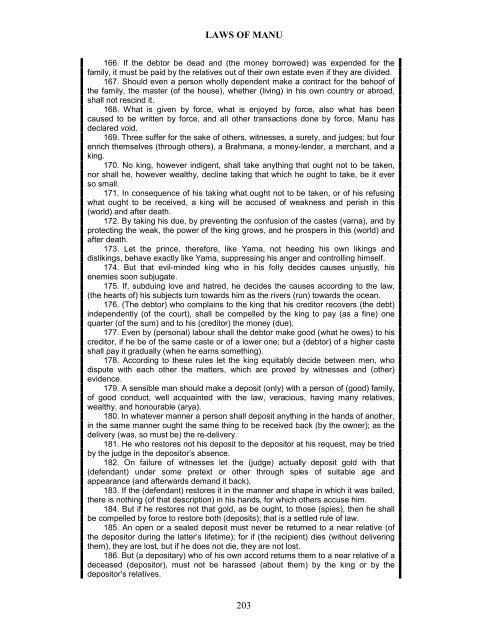Create successful ePaper yourself
Turn your PDF publications into a flip-book with our unique Google optimized e-Paper software.
LAWS OF MANU<br />
166. If the debtor be dead and (the money borrowed) was expended for the<br />
family, it must be paid by the relatives out of their own estate even if they are divided.<br />
167. Should even a person wholly dependent make a contract for the behoof of<br />
the family, the master (of the house), whether (living) in his own country or abroad,<br />
shall not rescind it.<br />
168. What is given by force, what is enjoyed by force, also what has been<br />
caused to be written by force, and all other transactions done by force, Manu has<br />
declared void.<br />
169. Three suffer for the sake of others, witnesses, a surety, and judges; but four<br />
enrich themselves (through others), a Brahmana, a money-lender, a merchant, and a<br />
king.<br />
170. No king, however indigent, shall take anything that ought not to be taken,<br />
nor shall he, however wealthy, decline taking that which he ought to take, be it ever<br />
so small.<br />
171. In consequence of his taking what ought not to be taken, or of his refusing<br />
what ought to be received, a king will be accused of weakness and perish in this<br />
(world) and after death.<br />
172. By taking his due, by preventing the confusion of the castes (varna), and by<br />
protecting the weak, the power of the king grows, and he prospers in this (world) and<br />
after death.<br />
173. Let the prince, therefore, like Yama, not heeding his own likings and<br />
dislikings, behave exactly like Yama, suppressing his anger and controlling himself.<br />
174. But that evil-minded king who in his folly decides causes unjustly, his<br />
enemies soon subjugate.<br />
175. If, subduing love and hatred, he decides the causes according to the law,<br />
(the hearts of) his subjects turn towards him as the rivers (run) towards the ocean.<br />
176. (The debtor) who complains to the king that his creditor recovers (the debt)<br />
independently (of the court), shall be compelled by the king to pay (as a fine) one<br />
quarter (of the sum) and to his (creditor) the money (due).<br />
177. Even by (personal) labour shall the debtor make good (what he owes) to his<br />
creditor, if he be of the same caste or of a lower one; but a (debtor) of a higher caste<br />
shall pay it gradually (when he earns something).<br />
178. According to these rules let the king equitably decide between men, who<br />
dispute with each other the matters, which are proved by witnesses and (other)<br />
evidence.<br />
179. A sensible man should make a deposit (only) with a person of (good) family,<br />
of good conduct, well acquainted with the law, veracious, having many relatives,<br />
wealthy, and honourable (arya).<br />
180. In whatever manner a person shall deposit anything in the hands of another,<br />
in the same manner ought the same thing to be received back (by the owner); as the<br />
delivery (was, so must be) the re-delivery.<br />
181. He who restores not his deposit to the depositor at his request, may be tried<br />
by the judge in the depositor’s absence.<br />
182. On failure of witnesses let the (judge) actually deposit gold with that<br />
(defendant) under some pretext or other through spies of suitable age and<br />
appearance (and afterwards demand it back).<br />
183. If the (defendant) restores it in the manner and shape in which it was bailed,<br />
there is nothing (of that description) in his hands, for which others accuse him.<br />
184. But if he restores not that gold, as be ought, to those (spies), then he shall<br />
be compelled by force to restore both (deposits); that is a settled rule of law.<br />
185. An open or a sealed deposit must never be returned to a near relative (of<br />
the depositor during the latter’s lifetime); for if (the recipient) dies (without delivering<br />
them), they are lost, but if he does not die, they are not lost.<br />
186. But (a depositary) who of his own accord returns them to a near relative of a<br />
deceased (depositor), must not be harassed (about them) by the king or by the<br />
depositor’s relatives.<br />
203


















